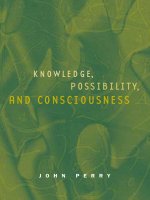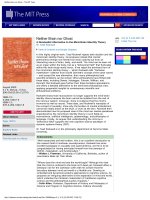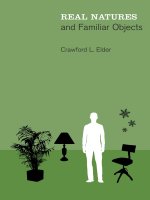the mit press true to life why truth matters oct 2004
Bạn đang xem bản rút gọn của tài liệu. Xem và tải ngay bản đầy đủ của tài liệu tại đây (1.42 MB, 217 trang )
TRUE
TO
LIFE
WHY TRUTH MATTERS
MICHAEL P. LYNCH
True to Life
True to Life
Why Truth Matters
Michael P. Lynch
A Bradford Book
The MIT Press
Cambridge, Massachusetts
London, England
© 2004 Massachusetts Institute of Technology
All rights reserved. No part of this book may be reproduced in any form by any elec-
tronic or mechanical means (including photocopying, recording, or information stor-
age and retrieval) without permission in writing from the publisher.
This book was set in Stone and Stone Sans by Graphic Composition, Inc.
Printed and bound in the United States of America.
Library of Congress Cataloging-in-Publication Data
Lynch, Michael P. (Michael Patrick), 1966– .
True to life : why truth matters / Michael P. Lynch.
p. cm.
“A Bradford book.”
Includes bibliographical references and index.
ISBN 0-262-12267-7 (hc : alk. paper)
1. Truth. I. Title.
BD171.L869 2004
121—dc22
2003070640
10987654321
to Bridget
Contents
Preface xi
Introduction 1
Part I Cynical Myths 7
1Truisms about Truth 9
The Conversation-stopper 9
Truth Is Objective 10
Truth Is Good 12
Truth Is a Worthy Goal of Inquiry 13
Truth Is Worth Caring about for Its Own Sake 15
Good Ideas and Bad 19
2 Is the Truth Unattainable? 21
Nightmare 21
A Map of the World 22
Safety 27
3 Is Truth Relative? 31
Man Is the Measure 31
Simple(minded) Relativism 32
Truth as Power 35
Relativism without Nihilism 41
4 The Truth Hurts 45
Dangerous Knowledge 45
Exceptions That Prove the Rule 46
Context and Significance 51
Questions and Answers 54
Part II False Theories 59
5Truth as a Means to an End 61
Round and Round We Go 61
The Right Tool for the Job 63
Why (Classical) Pragmatism Doesn’t Work 66
A More Coherent Suggestion? 68
Differences That Make a Difference 70
6Truth and the Scientific Image 75
Naturalism and Human Values 75
Truth as What Science Tells Us 77
Mind as Map 83
Moore’s Problem 88
Naturalism as Nihilism 91
The Motivational Tractor-beam 93
The Possibility of Pluralism 95
7Truth as Fiction 101
Analogies 101
Nietzchean Lessons? 102
Minimalism 107
Part III Why Truth Matters 117
8Truth and Happiness 119
A Personal Question 119
Know Thyself 120
Caring about Truth 128
Integrity 131
Happiness 136
More Questions, More Answers 143
9 Sweet Lies 147
Liar, Liar 147
Sincerity 153
10 Truth and Liberal Democracy 159
We Are Not Lying 159
The Social Value of Truth 160
viii Contents
Truth and Rights 162
The Silence of Slavery 174
Epilogue 179
Notes 183
Index 201
Contents ix
Preface
This book is about why truth matters in our personal and political lives. The
last hundred years have seen a considerable amount of writing on truth by
philosophers, but much of it has been preoccupied with formal questions of
definition and paradox. While this work is of considerable importance, it can
leave the average person feeling rather nonplussed; it rarely addresses the
concerns that cause us to worry about truth in the first place. One of the aims
of this book is to correct that.
Another aim is to be clear. I like my philosophy straightforward and un-
clogged with academic technicalities. Even the deepest philosophical prob-
lems can be appreciated by anyone willing to roll up his or her intellectual
sleeves and think hard. That is what I’ve tried to do in this book: grapple with
the issues in a way that brings the reader with me. Consequently, I have tried
to keep the technicalities to an absolute minimum.
I have been thinking about these problems for several years, and am grate-
ful to many people for their help, although none is to blame for the results.
Work on the book was made possible by a sabbatical generously granted by
Connecticut College during the academic year 2002–2003 and a Bogliasco
Fellowship in spring 2003 at Liguria Study Center. Versions of various parts of
the book benefited from comments received during talks at The University of
St. Andrews, The Moral Sciences Club at Cambridge, The University of Wales
at Cardiff, The University of Genoa, The University of Turin, Florida State
University, the University of California Fullerton, the University of Cincin-
nati, The University of Mississippi, and Tufts University. In the fall of 2002, I
was fortunate to be a Visiting Fellow at the Arché center at the University of
St. Andrews, where I benefited from conversations with numerous people,
particularly Crispin Wright, as well as with J. C. Beall, John Haldane, and
Patrick Greenough. In addition, many people suffered through early versions
of various parts of the manuscript, and helped me to avoid numerous prob-
lems. Thanks to Robert Barnard, Eddy Nahmias, Bridget Lynch, Patty Lynch,
Tom Bontly, Derek Turner, Chase Wrenn, and Chris Gauker. Heather Battaly,
Tom Polger, and Paul Bloomfield, old friends and sparring partners, deserve
special mention for their copious and helpful commentary on various ver-
sions of the manuscript. William Alston, teacher and friend, and whose work
strongly influenced (the good) ideas in this book, also provided significant
comments on the manuscript at a late stage. Most important, I thank Terry
Berthelot, whose relentless insistence on clarity and penetrating criticism
were matched only by her unflagging support, and amazing tolerance for her
husband’s eccentricities. Terry’s influence on this book is deep. I literally
couldn’t have written it without her.
Portions of chapter 7 are based on material that appears in “Minimalism
and the Value of Truth,” Philosophical Quarterly 55 © 2005, The Editors of
Philosophical Quarterly.
Thanks too to my copy editor Judy Feldmann, and to my editor Tom Stone,
for knowing what matters.
xii Preface
Introduction
In early 2003 President Bush claimed that Iraq was attempting to purchase
the materials necessary to build nuclear weapons.
1
Although White House
officials subsequently admitted they lacked adequate evidence to believe this
was true, various members of the administration dismissed the issue, noting
that whether or not every claim made by the president was accurate, the im-
portant thing was that the subsequent invasion of Iraq achieved stability in
the region and the liberation of the country.
2
Many U.S. citizens apparently agreed. After all, there were other reasons to
depose the Hussein regime. And the belief that Iraq was an imminent nuclear
threat had rallied us together and provided an easy justification to doubters
of the nobility of our cause. So what if it wasn’t really true? To many, it seemed
naive to worry about something as abstract as the truth or falsity of these
claims when we could concern ourselves with the things that really matter—
such as protecting ourselves from terrorism and ensuring our access to oil. To
paraphrase Nietzsche, the truth may be good, but why not sometimes take
untruth if it gets you where you want to go?
These are important questions. At the end of the day, is it always better to
believe and speak the truth? Does the truth itself really matter? While gener-
alizing is always dangerous, the above responses to the Iraq affair indicate
that many people would look at these questions with a jaundiced eye. We are
rather cynical about the value of truth.
Politics isn’t the only place that one finds this sort of skepticism. A similar
attitude is commonplace among some of our most prominent public intel-
lectuals. Indeed, under the banner of postmodernism, cynicism about truth
and related notions like objectivity and knowledge has become the semioffi-
cial philosophical stance of many academic disciplines. Roughly speaking,
the attitude is that objective truth is an illusion and “truth” is just another
name for power. Consequently, if truth is valuable at all, it is valuable—as
power is—merely as a means.
Stanley Fish, a prominent literary critic and Dean at the University of Illi-
nois at Chicago, has recently cranked up the antitruth rhetoric even further.
3
Not only is objective truth an illusion, according to Fish, even worrying
about the nature of truth in the first place is a waste of time. Debating over an
abstract idea like truth is like debating over whether Ted Williams was a bet-
ter pure hitter than Hank Aaron: amusing, but irrelevant to today’s game.
Paradoxically, Fish’s reasons for thinking this are a consequence of his par-
ticular theory of truth. According to Fish, philosophical discussions about
truth are a waste of time because he thinks that truth has no value. Further-
more, he thinks this is what we already believe. Sure, we may say we want to
believe the truth, but what we really desire, he says, is to believe what is use-
ful. Good beliefs are useful beliefs, those that get us what we want, whether
that is nicer suits, bigger tax cuts, or a steady source of oil for our SUVs. At the
end of the day, the truth of what we believe and say is beside the point. What
matters are the consequences.
Fish’s rough and ready pragmatism taps into one of our deeper intellectual
veins. It appeals to the United States of America’s collective self-image as a
square-jawed action hero. And it may partly explain why the outcry against
the White House’s deception over the war in Iraq was rather muted. It is not
just that we believe that “united we stand,” it is that deep down, many of us
are prone to think that it is results, not principles, that matter. Like Fish and
Bush, some of us find worrying over abstract principles like truth to be boring
and irrelevant nitpicking, best left to the nerds who watch C-Span and worry
about whether the death penalty is “fair.”
Of course, many other intellectuals are eager to defend the idea that truth
matters. Unfortunately, however, some defenses of the value of truth just end
up undermining that value in a different way. There is a tendency for some to
believe, for example, that caring about truth means caring about the “absolutely
certain” truths of old. This has always been a familiar tune on the political right,
whistled with fervor by writers from Allan Bloom to Robert Bork, but its vol-
ume has only appeared to increase since September 11. U.S. citizens have lost
their “moral compass” and need to sharpen their vision with “moral clarity.”
Liberal inspired relativism is weakening the nation’s resolve, we are told; in
order to prevail (against terrorism, the “assault” on family values, and the like)
2 Introduction
we must rediscover our God-given access to the truth. And that truth, it seems,
is that we are right, and everyone else is wrong. Here is William Bennett:
In one form or another, an easy-going relativism, both moral and cultural, is our com-
mon wisdom today. But things did not used to be that way. It used to be the case that a
child in this country was brought up to revere its institutions and values, to identify
with its customs and traditions, to take pride in its extraordinary achievements, to ven-
erate its national symbols. . . . The superior goodness of the American way of life, of
American culture in the broad sense, was the spoken and unspoken message of this on-
going instruction in citizenship. If the message was sometimes overdone, or sometimes
sugarcoated, it was a message backed by the record of history and by the evidence of
even a child’s senses.
4
So in the halcyon days of old when the relativists had yet to scale the garden
wall, the truth was so clear that it could be grasped by “even a child’s senses.”
This is the sort of truth Bennett seems to think really matters. To care about ob-
jective, nonrelative truth is to care about what is simple and felt to be certain.
As a defense of the value of truth, this is self-defeating. First, an unswerving
allegiance to what you believe isn’t a sign that you care about truth. It is a sign
of dogmatism. Caring about truth does not mean never having to admit you
are wrong. On the contrary, caring about truth means that you have to be
open to the possibility that your own beliefs are mistaken. Second, this dog-
matic attitude, the sense of “superiority” Bennett is encouraging, confuses
caring about truth with caring about what you believe is certain. As a result,
it tends to undermine rather than support a concern for truth. For we are
grown-ups, and our vision, unlike that of a child, is more prone to pick out
shades of gray. Consequently, most of us know that it is unlikely that we will
ever be absolutely sure of very much. But if we then confuse the pursuit of
truth with the impossible pursuit of a feeling of certainty, then truth, too, sud-
denly seems out of reach. It becomes a target we’ll never know we’ve hit, and
thus a target no longer worth aiming for in the first place.
Cynicism about truth is widely shared, but it is not inevitable. We are prone
to cynicism not so much because we find it so wonderful, but because we are
confused about what truth is and how it can be valuable. And this in turn
causes us to buy into some of the same tired assumptions about truth. Philoso-
phers like Fish say that since faith in the absolute certainties of old is naive,
truth is without value. Writers like Bennett argue that since truth has value,
we had better get busy rememorizing those absolute certainties. The implicit
assumption of both views is that these are the only two choices: Absolute
Introduction 3
Certain truth with a capital “T,” or no truth at all. With options like these, no
wonder we are prone to throw up our hands.
This book is a philosophical exploration and defense of the idea that truth
matters. I’ll try to convince you that if you care about truth you better not care
about dogma; that a lot, but not all, of what goes under the label “relativism”
is dumb; that you nonetheless don’t have to believe in one true story of the
world; that staying true to yourself is hard but worth it; that being willing to
stand up for what you believe is important for happiness; and that if you care
about your rights, you better care about truth. We need to think our way past
our confusion and shed our cynicism about the value of truth. Otherwise, we
will be unable to act with integrity, to live authentically, and to speak truth to
power.
Specifically, this book can be seen as a defense of four claims: that truth is
objective; that it is good to believe what is true; that truth is a worthy goal of
inquiry; and that truth is worth caring about for its own sake. The argument
proceeds in parts. In the first part, I try to diagnose and refute the most com-
mon confusions and mistaken assumptions that lead us to be cynical about
truth. Some of these confusions I’ve already mentioned: truth doesn’t matter
because it is unattainable; truth doesn’t matter because it is relative; and truth
doesn’t matter because falsehood is often more useful. Each of these ideas is
understandable; but each, I argue, is mistaken. Part II is about certain theories
of truth. Cynicism about truth is not just the result of confusion and misun-
derstanding. It is also the result of the prevalence of certain philosophical the-
ories about what truth is. I discuss and criticize three of the most important.
The third part of the book explains why truth matters. My approach is from
the inside out, so to speak. I begin with some deeply personal reasons for car-
ing about truth; I argue that perhaps surprisingly, it is part of living a happy
life. I next discuss why caring for truth is important in our personal relations
to others. And I end by examining truth’s political value, in particular the
connection between a concern for truth and a concern for human rights.
Thinking through why we care about something can help us come to a bet-
ter understanding of what it is. Thinking about why we should care about
truth tells us two things about it: first, that truth is, in part, a deeply norma-
tive property—it is a value. And second, this is a fact that any adequate the-
ory of truth must account for. In light of this fact, I suggest that truth, like
other values, should be understood as depending on, but not reducible to,
lower-level properties. Yet which properties truth depends or supervenes on
4 Introduction
may change with the type of belief in question. This opens the door to a type
of pluralism: truth in ethics may be realized differently than in physics.
The questions that matter are live ones, ones that face us everyday. “Why
care about truth?” is such a question. For despite our dislike of illusion, we
don’t often care about truth as much as we should: we dissemble, hide behind
ambiguity, refrain from speaking up, we turn away, stop asking questions, ig-
nore reasonable objections, fudge the data, and close our minds. Not caring
about the truth is a type of cowardice. And the very fact that it happens means
that the question of why we should care about truth is both important and
terribly personal.
It also means that our answers to it must be human ones. Consequently, the
value of truth I defend in this book isn’t an abstract, absolute ideal. I have no
interest in putting truth on a pedestal. Truth is worthy of caring about, but it
isn’t worthy of worship. It is only one value among others, and it isn’t even
the most important value—if there even is such a thing. If truth matters, it
must matter to us, in the confusing, conflicted lives of real human beings. If
the argument that follows is sound, we may be confident that it does.
Introduction 5
Part I Cynical Myths
1Truisms about Truth
The Conversation-stopper
Ask someone what truth is and you are apt to be greeted by either puzzled si-
lence or nervous laughter. Both reactions are understandable. Truth is one of
those ideas—happiness is another—that we use all the time but are at a loss
to define. This is why the question “What is truth?” is so often treated as
rhetorical.
One of the reasons truth seems so difficult to describe is that we have con-
flicting beliefs about it: we sometimes think it is discovered, sometimes cre-
ated, sometimes knowable, sometimes mysterious. When we use the idea in
ordinary life—as we do when we agree or disagree with what someone has
said—it seems a simple matter. Yet the more we stop to think about it, the
more complicated it becomes.
It would be nice if we could sort out, once and for all, everything we
thought about truth—to find out the whole truth and nothing but the truth
about the truth, as it were. Nice, but practically impossible. The thesis of this
book is much simpler. Of the many things you could believe about truth,
there is at least one that you should believe: truth matters. Truth, I shall try to
convince you, is of urgent importance in both your personal and political life.
The idea that truth matters actually sums up four claims. Together, these
truisms, as I’ll call them, explain what I mean by “truth” and what I mean by
its “mattering.” Accordingly, I begin by introducing these truisms about
truth, with an aim toward convincing you that they are just what I say they
are, obvious truisms. This doesn’t mean that everyone agrees with them. As I
already noted, some of us are confused about truth—we have contradictory
beliefs about it. So we may believe these truisms but also believe something
else that undermines our belief in one or all of them. Moreover, nothing is so
obvious that someone hasn’t proclaimed it to be false, misguided, naive, in-
coherent, impossible, or corrupting for the young. And lots and lots of folks,
as we’ll see, continue to say as much about these four ideas.
Wittgenstein once remarked that the job of the philosopher was to “assem-
ble reminders”—to point out to us what has been right there in front of our
face all along. While this isn’t all that a philosopher does, there is a lot of sense
in this point. The very familiarity of something can make us forget, or even
deny, its importance. When that happens, we need to be reminded of its role
in our everyday life. This is what we need in the case of truth.
Truth Is Objective
If I know anything, it is that I don’t know everything and neither does anyone
else. There are some things we just won’t ever know, and there are other
things that we think we know but don’t. Grant this bit of common sense, and
you are committed to the first truism about truth: truth is objective.
Early on in Shakespeare’s most celebrated play, Hamlet and his rather book-
ish friend Horatio see the ghost of Hamlet’s dead father. Not surprisingly, Ho-
ratio has a hard time coming to grips with the fact that a dead Danish monarch
is haunting the castle battlements. Hamlet’s response to Horatio’s worrying
is brusque: there are more things in heaven and earth, he says, than dreamt of
in Horatio’s philosophy. Hamlet’s point is to remind Horatio that he doesn’t
know it all because the universe is bigger than we are.
Not only, like Hamlet, are we sometimes ignorant; we also make mistakes.
People once believed that the Earth was flat. Most of us now regard this as a
rather silly idea. But imagine for a moment living in a time before advanced
mathematics, before long-distance sea voyages, before airplanes, before pho-
tographs. Would you believe the Earth was flat? Of course you would. Just
look at it, you would say, gesturing off toward the (flat) horizon.
Even well-supported scientific theories can be wrong. Seventeenth-century
chemists, for example, noted correctly that something similar happens when
metal rusts and wood burns. Undergoing both processes results in a loss of
mass. According to the very best science of the day, the common cause was
the release of an invisible gas, “phlogiston,” into the atmosphere.
1
Since this
gas took up space, had weight, and so on, its loss explained why both metal
and wood got smaller after rusting and burning. It is easy to snicker at the
phlogiston theory nowadays, since while there is a gas involved in both pro-
10 Chapter 1
cesses, it is actually oxygen, which is gained, not lost, by the relevant system.
Phlogiston doesn’t exist. Yet the phlogiston theory was a very reasonable hy-
pothesis at the time. It was highly confirmed by the standards of the day. The
most knowledgeable scientists believed it. Yet it was mistaken.
The ever-present risks of ignorance and error underline the fact that what-
ever else it may turn out to be, truth is objective. Just because we believe it
doesn’t mean it’s true, and just because it is true doesn’t mean we’ll believe it.
Believing, as we say, doesn’t make it so. The truth of Mt. Everest being the
tallest mountain, for example, has nothing to do with whether I believe it or
not. What matters is whether Mt. Everest really is the tallest mountain, and if
it is, then presumably it would be even if no one had ever been around to see
it. Of course, if there weren’t any language-users around, then Mt. Everest
wouldn’t be called “Mt. Everest,” since it wouldn’t be called anything at all.
But it would still be there, just as it would if we had called it something else,
like “Mt. Zippy.”
Voltaire once quipped that “let us define truth, while waiting for a better
definition . . . as a statement of the facts as they are.”
2
Voltaire meant this as a
joke, but as working definitions go, it is pretty good. And Voltaire himself was
probably thinking of a famous remark of Aristotle’s that “to say of that which
is, that it is, and of that which is not, that it is not, is true.”
3
This is even better.
When we say something true, the world is as we say it is. And when we believe
truly, the world is as we believe it to be. It is the way the world is that matters
for truth, not what we believe about the world.
In this sense, the objectivity of truth isn’t, or shouldn’t be anyway, contro-
versial. As I’ve indicated, it is a consequence of accepting what everyone al-
ready does (or should) admit: we don’t know everything and we can make
mistakes.
The idea that truth is objective is sometimes put by saying that true beliefs
correspond to reality. And that is fine, just so long as we realize that this phrase
leaves room for disagreement about the nature and extent of what “correspon-
dence” and “reality” amount to. Some hold that beliefs can’t be true unless
they correspond to mind-independent, physical objects like mountains, elec-
trons, battleships, and barbers. On these theories, truth is always radically
objective, since what makes our beliefs true on such accounts is always their
relationship to real physical objects. This is obviously a matter of high philo-
sophical theory, however, and not a truism. You don’t have to believe it in or-
der to believe that truth is objective in the minimal sense I’ve been describing.
Truisms about Truth 11
We don’t have to know everything about something to be able to talk about
it. Take, for example, the hard drive of my computer, which (I blush to confess)
I know next to nothing about. I don’t know what it is made out of (little bits
of metal and plastic probably), I don’t know where it is exactly, and I don’t
know really how it gets its job done. But I do know what that job is: it acts as the
main information-storage facility for my computer, where it keeps the various
programs and files. For most purposes, this working description of a hard drive
is good enough. It picks out what we generally mean when we talk about such
things. Indeed, a lot of our ordinary concepts are like this, and it is a good
thing too. This is why we can talk about something like gravity in a meaning-
ful way before we know its real underlying nature, or even if we never learn
about its real nature. We know what gravity does before we know what it is.
Our basic belief in truth’s objectivity is like my basic idea of my computer’s
hard drive. We know the job of true beliefs, even if we don’t know exactly how
they get that job done. True beliefs are those that portray the world as it is and
not as we may hope, fear, or wish it to be.
Truth Is Good
Nobody likes to be wrong. If anything is a truism, that is. And it reveals some-
thing else we believe about truth: that it is good. More precisely, it is good to
believe what is true.
Why do we find it so obvious that it is good to believe what is true? One rea-
son has to do with the purpose of the very concept of truth itself. Humans
tend to disagree with each other: we squabble, spat, form different opinions,
and construct different theories. Yet the very possibility of disagreement over
opinions requires there to be a difference between getting it right and getting
it wrong. When I assert an opinion on some question, I assert what I believe
is correct. Yo u do the same. And when we disagree, obviously, we disagree
about whose opinion is correct. So if there is no such thing as reaching one (or
none, or even more than one) correct answer to a given question, then we
can’t really disagree in opinion.
My point is that we distinguish truth from falsity because we need a way of
separating correct from incorrect beliefs, statements, and the like. In particu-
lar, we need a way of distinguishing between beliefs for which we have some
evidence, or are endorsed by the Pentagon, or denounced by the president, or
make us money, or friends, or simply feel good, and those that actually end up
12 Chapter 1









